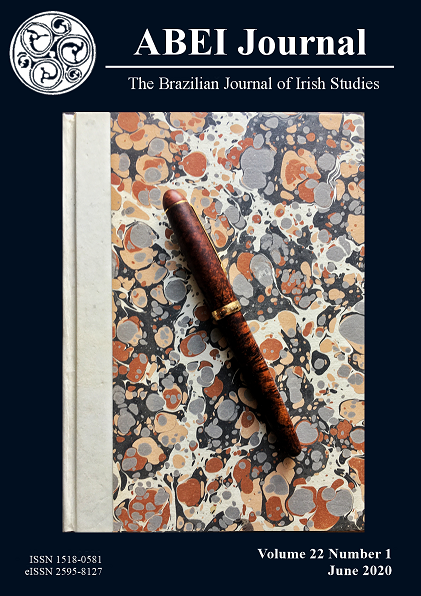Banville and Lacan: The Matter of Emotions in The Infinities
DOI:
https://doi.org/10.37389/abei.v22i1.3854Keywords:
Banville e Lacan, Emotions, The Infinities, Object a, Scopic drive, The Libidinal RealAbstract
Both Banville and Lacan are Freudian interpreters of the postmodern world. Both replace the classic physical-metaphysical dichotomy with a focus on the materiality of communication in an emophysical world. Both chart the ways in which libidinal streams combine parts of the self and link the self with other people and objects. These interactions take place in three bandwidths of perception, which are re-arranged by the uncanny object a. This ‘object’ reawakens the affects of the unconscious which infuse the identity formations with new energy. In this article we look briefly at how the object a is realised in The Book of Evidence, Ghosts and Eclipse to focus on how it works in The Infinities, especially in the relations between Adam Godley junior and senior, Helen and Hermes.
References
Banville, John. The Book of Evidence. London: Minerva, 1994.
---. Ghosts. London: Minerva, 1993.
---.. Eclipse. London: Picador, 2000.
--- The Infinities. London: Picador, 2009.
Barthes, Roland. “Le Plaisir du texte.” Oeuvres completes IV. Livres, Textes, entretiens 1972-1976. Nouvelle edition revue, corrigée et présentée par ‘Éric Mary. Paris: Seuil, 2002; 219-261.
Brousse, Marie-Hélène. “The Drive”. Reading Seminar XI. Lacan’s Four Fundamental Concepts of Psychoanalysis. Ed. Richard Feldstein, Bruce Fink, Maire Jaanus. New York: State University of New York Press, 1995; 99-117.
Coughlan, Patricia. “Banville, the feminine, and the Scenes of Eros.” Irish University Review: a journal of Irish Studies 36.1 (2006): 81-101. Literature Resource Center. Web. 11 Mar. 2012.http://go.galegroup.com/ps/i.do?id=GALE%7CA147928074&v=2.1&u=leuven&it=r&p=LitRC&sw=w
Feldstein, Richard. “The Phallic gaze of Wonderland” Reading Seminar XI. Lacan’s Four Fundamental Concepts of Psychoanalysis. Eds. Richard Feldstein, Bruce Fink, Maire Jaanus. New York: State University of New York Press, 1995. 149-174.
Földváry, Kinga. “In Search of a Lost Future: The Posthuman Child.” European Journal of English Studies, 18:2, (2014); 207-220, DOI: 10.1080/13825577.2014.917008
Flaubert, Gustave. “Letter to Louise Colet.” https://www.etudes-litteraires.com/flaubert-art.php
Johnston, Adrian. “The object in the mirror of genetic transcendentalism: Lacan’s ‘objet petit a’ between visibility and invisibility” Continental Philosophy Review vol. 46, 2013; 251–269.
Lacan, Jacques. Séminaire VII (1959-1960). L’éthique de la psychanalyse. Paris: Seuil, 1986.
---. Séminaire XI (1964). Les quatre concepts fondamentaux de la psychanalyse. Le Champ freudien . Paris: Seuil, 1973.
---. Le Séminaire XX (1972-73). Encore. Le Champ Freudien, Texte établi par Jacques-Alain Miller. Paris, 1975.
O’Connell, Mark. “The Empathic Paradox. ThirdPerson Narration in John Banville’s First Person Narratives.” Orbis Litterarum, Vol. 66, issue 6; 2011; 427-447. https://doi-org.kuleuven.ezproxy.kuleuven.be/10.1111/j.1600-0730.2011.01027.x
---. “On Not Being Found: A Winnicottian Reading of John Banville’s Ghosts and Athena.” Studies in the Novel, 43: 3, 2011, 328-342.
Radley, Bryan. “John Banville’s Comedy of Cruelty.” Nordic Irish Studies 9, 2010, 13-31. https://www.jstor.org/stable/41702647
Ragland, Ellie. “The Relation between the Voice and the Gaze”. Reading Seminar XI. Lacan’s Four Fundamental Concepts of Psychoanalysis. Eds. Richard Feldstein, Bruce Fink, Maire Jaanus. New York: State University of New York Press, 1995; 187-204.
Schwall, Hedwig. “‘Mirror on Mirror Mirrored is all the Show’: Aspects of the Uncanny in Banville's Work with a Focus on Eclipse.” Irish University Review 36.1 (2006): 116-33.
---. “An Iridescent Surplus of Style: Features of The Fantastic in Banville’s The Infinities” in Nordic Irish Studies 9, 2010, 89-107.
Žižek , Slavoj. “The Lamella of David Lynch.” Reading Seminar XI. Lacan’s Four Fundamental Concepts of Psychoanalysis. Ed. Richard Feldstein, Bruce Fink, Maire Jaanus. New York: State University of New York Press, 1995; 205-220.
---. Looking awry: an introduction to Jacques Lacan through popular culture. Cambridge: MIT Press, 1991.
Downloads
Published
Issue
Section
License
Copyright (c) 2020 Hedwig Schwall

This work is licensed under a Creative Commons Attribution-NonCommercial 4.0 International License.


